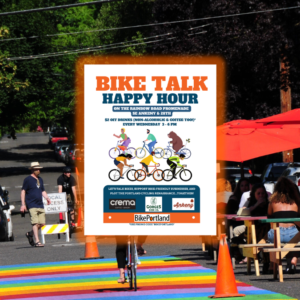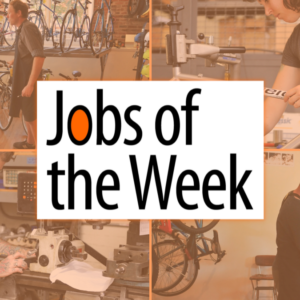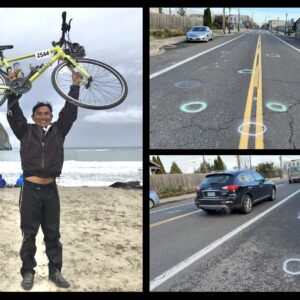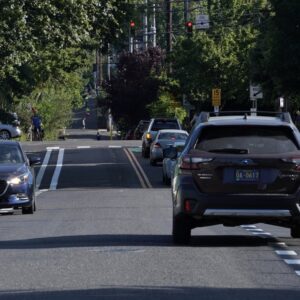
Office on Youth Crime Prevention]
On Wednesday I met with John Canda to hear his perspectives on how bikes might play a larger role in community policing.
John is the Mayor’s youth crime prevention czar. Prior to that, he led the Northeast Coalition of Neighborhoods, one of six coalitions that oversees 12 neighborhoods.
We met in the Humboldt neighborhood, just blocks from where John was born and raised and where his parents still have a home.
First, let me explain something. Recent attacks are what sparked my action on this issue, but I do not believe there is a rampant crime problem nor a major trend of random attacks on cyclists in the N Vancouver/Williams area. My interest is in the bigger picture.
I think bikes can play a major role in building stronger N/NE Portland communities. We still need more cops on bikes, but I also think citizen-led, volunteer bike patrols could be very effective too.
When I brought this idea up to John, he immediately liked it, but had concerns about liability:
“If the city asks for volunteers, and someone gets hurt, who’s responsible? As an experienced outreach worker, I know the limits of safety, but I’d be worried that volunteers won’t have that sense.”
To get around this, I suggested we simply add bicycles to the existing Community Foot Patrol program (an idea originally mentioned in this comment by Ethan). Why reinvent the wheel?
John agreed. He said, “that makes perfect sense” and added that the head of the Foot Patrol program (Stephanie Reynolds) would be “very excited about it” too.

John liked the idea in part because he knows first hand how bikes can be great tools to foster community connections.
He shared a story with me about how he and several other families used to do a church bike-pool. Once a month, they’d ride to First AME Church on N. Skidmore and Vancouver, picking up others along the way. John beamed as he told the story, recalling the fun and camaraderie of the rides.
“I never thought about bicycles like this before.”
–John Canda
I told John this is exactly why we need more people on bikes in our neighborhoods. On bikes, I said, you experience the environment in a much more intense way than car drivers or transit users. We hear, see and smell things you’d never know about in a car, and we can easily stop and engage with people or situations when we need to.
For example, a few weeks ago I smelled smoke while riding through my neighborhood. Slowing down and turning onto a sidestreet, I noticed flames in the backyard. Once I realized it was serious, I called 911.
Fire crews arrived minutes later and the house was engulfed in flames and smoke. Fortunately, the fire was controlled, no one was inside and most of their possessions were saved. The homeowners were grateful I stopped and called when I did (they also appreciated these photos).
If were in a car, I would have driven right by.
I sensed a light bulb go off in John’s head,
“Hmm. I never thought about bicycles like this before.”
When he said that, I knew I was making progress ;-).
Another reason I like volunteer bike patrols, is that I feel they can help improve our tattered image. Let’s face it, many Portlanders have a limited (and often negative) view of cyclists. John is one of them:
“I’m your average fair weather, recreational cyclist. I’m one of the people in gridlock, seeing bikers zoom by all crazy and thinking, I could never do that. I can’t relate to that. I think the public says, ‘if that’s what it (cycling) is, I’m not doing that, and I’m not supporting it either’.”
This common public perception is a serious detriment to improving cycling in this city and we’ll never get more people riding until we change it.
I also asked John for his feedback on getting more cops on bikes. While he agreed that it would help the neighborhoods, he pointed out one major obstacle:
“I think it’s a healthy conversation to have with the Mayor and Chief Sizer….and I don’t think you’d meet with a whole lot of resistance, but it would come back to manpower. We’re at one of our lowest points ever for recruits and manpower.”
John suggested that as a compromise, instead of asking for new, full-fledged bike patrol units, we should consider a mission based approach. Similar the the bicycle enforcement and pedestrian crosswalk missions the Police Bureau does, these patrols would be called out to a certain “hot-spots” for a finite amount of time.
[After thinking about this more after the meeting, I don’t think temporary patrols would be effective. The key to community policing are the relationships and trust built up by the officers over time. One-shot missions might help, but not nearly as much as established patrol units.]

I expect the Mayor and Police Chief to use the lack of manpower as an excuse to not create bike patrols. They commonly refer to the smaller coverage area of bikes vs. patrol cars and the inability for bikes to respond as quickly to urgent matters. But in my opinion this argument is specious.
If we had more cops on bikes, we’d need less manpower to begin with (because crime rates would decrease).
Even though it makes sense to us, there’s still work to do on both fronts. We’ve got to convince the Office of Neighborhood Involvement to add bikes to their Foot Patrol program and we’ve got to keep telling Mayor Potter that we want more cops on bikes.
From here, John wants to set up another meeting where he and I can present our ideas about bikes and community policing to some key decision makers including the Commander of the Northeast Precinct, someome from the Mayor’s Office, and others.
I still plan to organize a neighborhood forum, but I will wait until after I meet with John again before confirming details.
I look forward to the next steps, and it feels great moving ahead with someone like John Canda on our side.
[Note: I was encouraged to meet with John at the advice of Portland Mercury reporter Matt Davis. I’m grateful for that tip, thanks Matt.]







Thanks for reading.
BikePortland has served this community with independent community journalism since 2005. We rely on subscriptions from readers like you to survive. Your financial support is vital in keeping this valuable resource alive and well.
Please subscribe today to strengthen and expand our work.
Interesting interview, Jonathan. John Canada is a powerhouse and if you can get him on “our side” great things can happen. I particularly like your comment about how he beamed when recalling his days riding a bike to church with others.
In this day and age, bikes are seen as frivolous, toys, something for the weirdoes, the workout people or the alternative lifestyles. John’s remembrance of the enjoyable time he had is a great example of how most everyone can find a way to work bike rides into their lives. Maybe it’s not riding everywhere always, and for many riding to work isn’t a good way to start, but how about more church bike pools? If I were a church-goer, I’d be rallying for that.
Thanks for taking the time to meet with John and share this info with us. I look forward to further info about any resulting projects.
John, for what it’s worth, neighborhood bike patrols were discussed last Wednesday at the North Portland Public Safety Action Committee. We have ONI’s crime-prevention folks looking into the possibility of tailoring the foot patrol training for bikes.
This idea’s been kicking around for a couple of years, at least, but there’s never been any drive from the community to make it happen. Maybe we have that now. Thanks.
Bike Pools? Hmm, what a cool idea!
That would be fun for a whole lot of different events and clubs. I see it as a great way to inspire people that need just a bit of motivation or security to leave the car at home.
I have a vague recollection that Elly wrote an article last year suggesting a commuter bike pool similar to the church bike pool described by Mr. Canada. I think it was part of an essay on slowing down and enjoying the ride. Or am I just making that up? Either way, I think it’s an interesting idea.
yep, we’ve talked about bikepools around here before. At the request of Elly and others, I made a special section of the Forums, just to help people connect.
Check the forums for existing bikepools or start one yourself.
John was also excited about having a “welcome to the neighborhood” bike ride program where new residents would get shown around by volunteers… by bike!
But folks, ideas are easy… making them happen is where the work comes in. I hope you will all consider getting involved when the time comes…
Great interview. Mr. Canda perfectly summed up the perception “problem” about cycling. I appreciate his candor and that should be a starting point for BTA, PDOT, and others laboring on bike issues. Notice it’s a problem of relating to cyclists and not disdain for us. Too often we riders want to make it an “Us vs. Them” paradigm and become confrontaional.
Jonathan – Taking action and going beyond the talk is such a difficult step for many and I appreciate seeing that process featured on a “bike” blog. What you are doing here feels big and you should be proud that you are a not only a big part of the bike community but a big part of your whole community.
Great interview, Jonathan, and this is a great line of thinking that you’re running with. Bravo for constructive media response.
Oh and by the way, it isn’t that hard to do stuff like organize something like a bike pool — all you have to do is choose a day, time, destination, and say “hey, let’s!” to the relevant people.
And then remind them, with a sign or email or phone call or wave or something. With this sort of thing, I think, reminders are more than half the battle. The other half is showing up…not my own strength…
Anyway, pretty much the same formula goes for most other kinds of events you might have an idea for. So get to it!
Here here regarding Brad’s comment!
Turning and “us and them” into a “we” is a challenge, because it requires empathy, humility, maybe a little compromise. And a perspective that reveals commonality above differences. It is also the essence of community building. Thank you for your work, Jonathan.
“If we had more cops on bikes, we’d need less manpower to begin with (because crime rates would decrease).”
I was wondering if you could site some studies or references?
Thanks for the interview.
Jonathan, I really appreciate the approach you have taken to this topic. Thank you for all your hard work. This is a great example of why you are deserving of the Toeclips award.